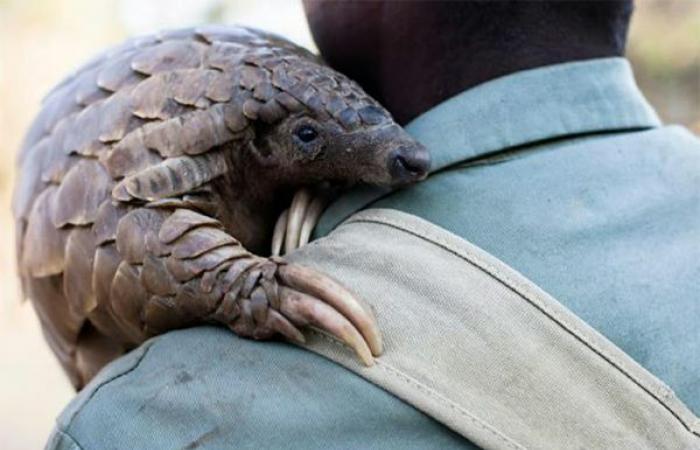A recent study demonstrates the extent of pangolin trafficking from Africa to Asia. And, the phenomenon is intensifying as Asian pangolin species disappear. Around 2.7 million pangolins are hunted in the forests of Central Africa each year. The NGO Traffic adds that between 650,000 and 8.5 million pangolins were torn from their environment between 2009 and 2020 throughout West Africa. Poaching and trafficking of pangolins in Africa, according to an international Ifaw study, increased by 150% in 2017 and more than 200% in 2020.
The latest Ifaw studies have shown that the volume and number of pangolin seizures has increased worldwide. As it becomes increasingly difficult to poach pangolins in Asia, traffickers are now turning to Africa, which has become their favorite hunting ground.
Recognized as one of the most trafficked animals on the planet, the pangolin is not hunted down to become a trophy like large mammals. But, it is hunted and traded illegally for its scales, believed to have medicinal properties, and for its meat, considered a delicacy in some countries, thus contributing to the decline of pangolin populations. Despite the lack of scientific evidence to support these claims, the demand persists.
Poaching not only has a devastating impact on pangolin populations, but also directly leads to the loss of individuals and disrupts their reproductive patterns, thereby preventing their numbers from recovering. The unregulated poaching industry, coupled with limited law enforcement resources in many African countries, poses significant challenges to effective pangolin conservation.
Kenya is a hub for continental pangolin trafficking. Species from Cameroon, the Democratic Republic of Congo and Senegal. In West Africa, Nigeria is a hub for trafficking in the species. Since 2021, Kenya has recorded 20 cases of pangolin seizures at airports. Even the false assertion that the pangolin is at the origin of the expansion of Covid-19 has not deterred traffickers.
Singapore intercepted one 14.2 tonne shipment and one 14 tonne shipment originating from West and Central Africa in 2019. Nearly 90% of the seized pangolin scales originated in or transited through Nigeria and Kenya. In April 2020, Malaysian Customs seized a shipment of 6 tonnes of pangolin scales hidden in peanut bags from Nigeria, bound for Vietnam.
In March 2020, thousands of kilograms of pangolin scales, worth 5 million euros, were seized at the border between Cameroon and Nigeria. The Eagle Network (Eco Activists for Governance and Law Enforcement), an organization that fights wildlife crime, assisted Cameroon Customs in this seizure.
Yet pangolins play a vital role in the ecosystem. Their eating habits help control insect populations which, if left unchecked, can have devastating consequences for the agricultural and forestry industries. By digging in anthills and termite mounds, pangolins aerate the soil, promoting plant growth and contributing to the balance of ecosystems.
Pangolins, as insectivores, serve as natural pest controllers. Their insatiable appetite for ants and termites helps control insect populations, thereby promoting overall ecological balance. Additionally, by digging into ant and termite mounds, pangolins inadvertently improve soil health and plant growth. As they search for their next meal, the actions of pangolins play a vital role in maintaining a healthy ecosystem.
In addition to their ecological importance, pangolins have unique physical characteristics that make them truly fascinating creatures. With their long, sticky tongues, they can extend up to 40 centimeters to capture their prey. Their tongues are coated in sticky saliva that allows them to easily trap ants and termites. Additionally, pangolins have sharp claws that they use to penetrate anthills and termite mounds. These claws are so powerful that they can easily tear through hard ground and tree bark.
In 2016, the pangolin was listed in Appendix 1 of the Convention on International Trade in Endangered Species of Wild Fauna and Flora (Cites), in other words among the most endangered species. His trade is prohibited. This convention has entered into force in 182 countries including China, plus the European Union.
Many countries have also adopted laws and policies to combat illegal wildlife trade and protect pangolins. Strengthening legal frameworks and increasing penalties for poaching and trafficking are essential steps to deter criminal activity.
Additionally, international collaborations such as Cites play a crucial role in regulating trade and promoting pangolin conservation. International conservation organizations such as the World Wide Fund for Nature (WWF) and the International Union for Conservation of Nature (IUCN) are actively involved in pangolin conservation efforts, not forgetting the enforcement role played by the Eagle network, in order to deter traffickers.
It is true, pangolin conservation faces multifaceted challenges, but the collective efforts of international organizations have played a pivotal role, increasing the focus on pangolin extinction and other endangered protected wildlife. ‘extinction.
Special correspondence






